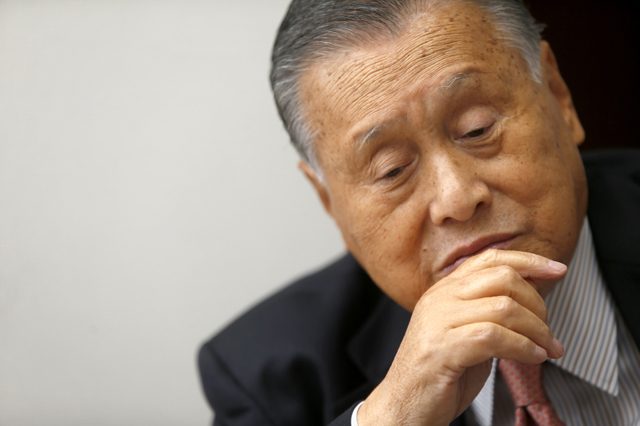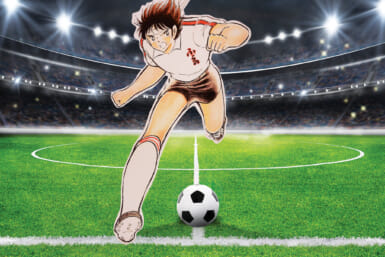Former Prime Minister of Japan, and current President of the Japan Rugby Football Union, Yoshiro Mori is not your typical politician. Well-built, jovial and extremely forthright, he even tried to scrum with us when we met up with him at his office in Tokyo.
He keeps a miniature rugby ball on his desk next to a photograph of him rising, along with other members of the bid team, to cheer after the 2020 Olympics host city announcement was made in Buenos Aires. Instrumental in Japan’s successful bid for the 2019 Rugby World Cup, Yoshiro Mori was recently tapped to head the Tokyo 2020 Olympic organizing committee.
Mori is still a member of parliament, but his time as Prime Minister was a short one (April 2000–April 2001), due in part to a tendency for off-the-cuff statements and political gaffes. However, many of the diplomatic moves that he made at the time—reaching out to Russia, India, and nations in Africa—look prescient in hindsight, given Japan’s recent foreign policy decisions.
But the first thing on his mind was his favorite sport. Mori knows that Japan does not have a strong tradition in rugby, but he hopes that Japan might be able to break into the Top 10 by the beginning of the 2015 World Cup in London. Seeing the Japan national team go head to head with New Zealand in a 2013 test match made one thing clear: “Our backs did not look good! We aren’t strong enough in those positions yet. There’s no amount of skill that can overcome sheer physical strength, and that is something we need to improve.”
“The Most Powerful Person on the Planet”
As he looks back at his tenure as Prime Minister, one of the things that stands out most was his relationship with Vladimir Putin. The two men met in 2000: Mori had just become Prime Minister after his predecessor, Keizo Obuchi, suffered a stroke, while Putin was just days away from being inaugurated as the Russian President.
“I remember that meeting well,” Mori tells us. “It was during Golden Week and I used that holiday to go to St. Petersburg to see Putin. Usually a new Japanese Prime Minister goes straight to Washington and then to Canada, but my thinking was different. Putin seemed very interested in meeting me. Soon after my inauguration I decided to go there. We spent more than ten hours together, eating lunch, watching an ice hockey game. I think during that time spent together we could understand each other as human beings.
It was the first of several meetings between the two leaders. Putin was even one of the first to know that Yoshiro Mori was stepping down after he revealed his decision to him during a visit to Irkutsk in March 2001.
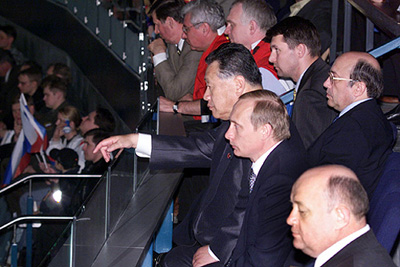
Mori and Putin at the opening ceremony of the 64th World Ice Hockey Championships in St. Petersburg, 2000
CC-BY-3.0
“We talked about all kinds of things, including my father and how to fix his country,” he says. “Prior to getting to know him I had this impression of him as a scary person. I mean, he was in the center of the KGB! The reality, however, was different. He looked like someone who was overwhelmed with sorrow, so I said to myself ‘he must be a melancholic fellow.’ I had that feeling and we started to talk rather openly.
We also visited a Japanese soldiers’ grave together. I took off my scarf and gloves, then prayed for loved ones. He asked me about it and I replied, ‘It is nothing to do with you; when I think about those Japanese soldiers who died from the cold, I can’t pray wearing a warm scarf and gloves.’ Then after my explanation, Putin took off his scarf and gloves and prayed for a while without a word.”
This close relation has continued into the present day. Early in 2013, he had a 70-minute meeting with the Russian President. Mori and the man that Forbes currently (and perhaps controversially) dubs “the most powerful person on the planet” met to discuss the “abnormal” absence of a peace treaty between their two native countries and the dispute over a group of Russian-held islands near Hokkaido. “He [Putin] basically told me that the two countries are currently completely out of sync,” Mori says. ”He insisted that we need to get on the same page first, and then we can start playing the game. He also used the phrase hikiwake (a martial arts term meaning “a draw”) to describe his hopes for a settlement. In other words he is hoping for a solution that would be acceptable for both sides.”
An Eye to Africa
Prime Minister Abe’s recent visit to the African continent took him to the countries of Ethiopia, Ivory Coast, and Mozambique, where he pledged billions of dollars in aid and development projects. Notably, Abe engaged in some rare displays of political showmanship, joking around with Ivory Coast president Alassane Outtara and exchanging national soccer jerseys. It’s possible that he may have gotten some coaching from the first Japanese prime minister to visit Africa: Yoshiro Mori went to South Africa, Kenya and Nigeria during his time in office.
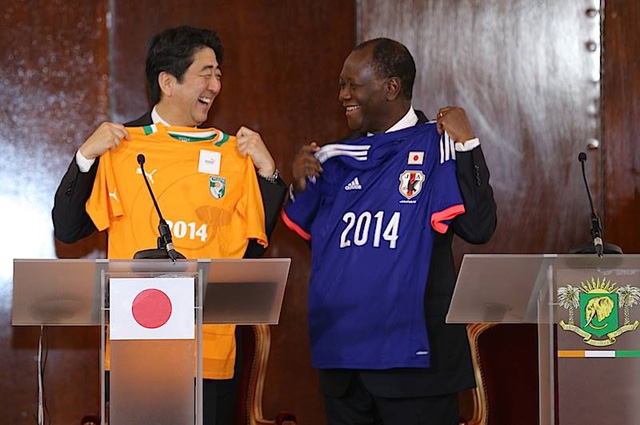
Abe and Ivory Coast President Alassane Ouattara (RTI)
Given Mori’s penchant for speaking his mind and going against the grain, he also pushed for greater inclusion of African nations on the global platform: “As a prime minister I held the 26th G8 Summit [in Nago, Okinawa] and as a host, I really wanted to invite African people. But French Prime Minister Jacques Chirac and US President Clinton said no because G8 was the place to talk about economy, not politics. But I invited three African heads to a party in Tokyo one day before we moved to the summit, and we traveled together. You know, I’d love to do what people say not to do, and this was the very beginning of African countries being invited to the summit.”
On Ties with India
Over the past months, Japan has focused renewed attention on India. Concerns about China’s continuing influence have warmed relations between the two countries: the Emperor and his wife visited in November 2013 on the 60th anniversary of Indo-Japanese diplomatic ties, followed by Prime Minister Abe himself this January. These moves serve to bolster the Comprehensive Economic Partnership Agreement between the two nations that was signed in 2010.
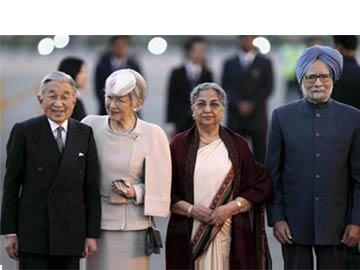
The Imperial couple made their first official visit to India last year (NDTV)
The initial cooling of relations was due in large part to the nuclear bomb tests that India performed in 1998, and the economic sanctions, initially led by the United States, that followed. According to Mori, the strong reaction on behalf of the US was as much a question of wounded pride as it was a matter of principle: “The American intelligence community was embarrassed because not detecting the preparations for the test was one of the ‘serious intelligence failures of the decade’.”
Japan also imposed sanctions that froze all loans and grants, barring humanitarian aid, but in keeping with his stubborn streak, Mori still chose to go to India during his time as prime minister in defiance of the sanctions. Looking to the future, Mori believes that the relations between the two nations will continue to improve, thanks to a shared religious tolerance— and perhaps some racial affinity.
“India is rather generous country about religion—they have Hindus, Buddhists and Christians. And we Japanese say, yaoyorozu no kami [“eight million gods,” a reference to the myriad gods in the Shinto tradition) so as for religion, we are both open-minded, permissive and tolerant nations. Mori also believes that Japan’s victory in the Russo-Japanese war “had a great impact on Indian people,” even encouraging the budding independence movement. “During the period of colonization, Indian people were thinking ‘colored people’ could never defeat white people. But the Japanese did. We didn’t supply weapons to India, but the psychological impact was big enough for them to be independent from Britain.”
Although his brash statements on sports and international politics may ruffle some feathers on the way to Tokyo 2020, it is clear that Yoshiro Mori will continue to listen to his convictions and call them as he sees them.
Main Image: Shugo Takemi

